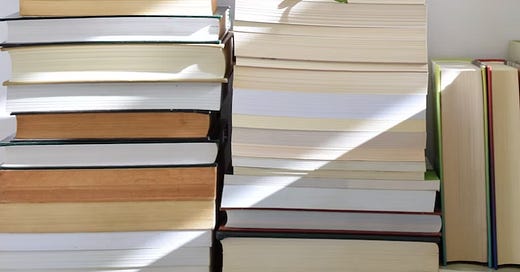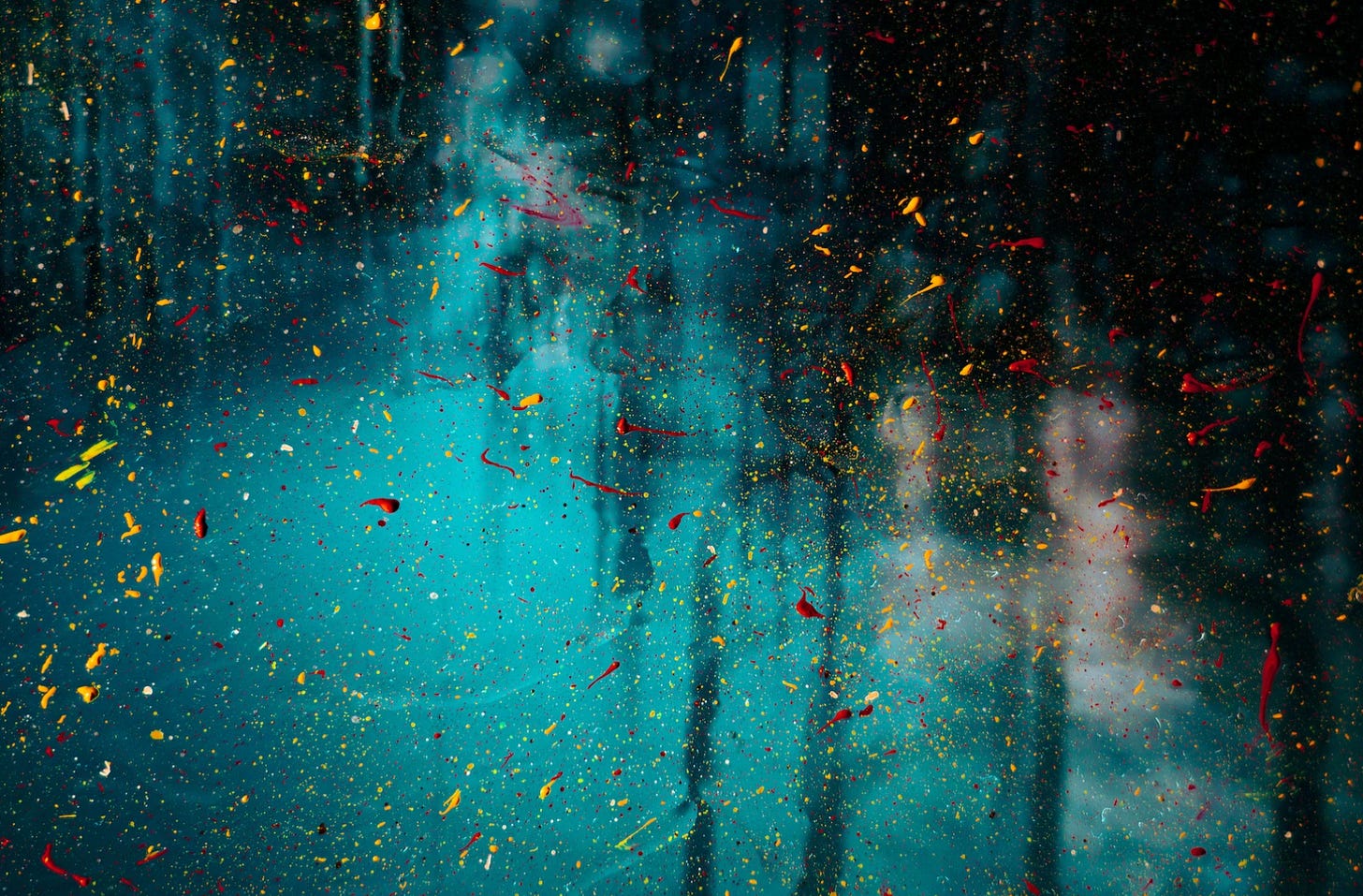Today on THE FRIDAY FEATURE we have the wonderful Joseph Massey, whose beautiful poetry and images have been a balm to many on Twitter and on his Substack over the last few years, including Megyn Kelly and many others who have shared his work. Since being ejected from the mainstream poetry world, he has successfully built an independent writing career between his self-published poetry volumes and regular Substack posts. It’s a pleasure to have him on today.
THE FRIDAY FEATURE: INTERVIEW WITH POET JOSEPH MASSEY
Kay Clarity: Thanks for agreeing to take time for this interview, Joseph.
Like many people, your presence online has been a great gift to me in a tumultuous time. Your poetry and photos are beautiful, and I am often amazed at how you are able to engage in the political sphere in some necessary and courageous ways, while never letting it overshadow your primary role as an artist. I think many people can learn from your approach. It’s rare. Has this approach been intentional, and either way, is there is anything you’ d like to share about keeping that balance?
Joseph Massey: In 1821, the English Romantic poet Percy Bysshe Shelley asserted that “poets are the unacknowledged legislators of the world.” I’ve always liked that description of what a poet does, for its brashness and truth in locating poetry as an essential underground current in the larger culture (“unacknowledged,” for sure).
The political component of poetry is inherent, unavoidable, engrained in the act of articulating where and how one stands in a broken world that takes language and turns it into a means for more death and delusion. Defiance is political. Poetry defies language wielded in service of demonic hypnosis by actively making meaning and naming things — as they are.
KC: I love that in a scattered and frenetic world, you continue unabashed in an earnest and sincere way on your path of beauty. This has also long been a passion of mine, too. I am also struck by your gentle, ongoing refusal to appeal to ego, or glory, or false pretences of importance. How do you stay grounded in being who you are and focused on what you care about when the world pulls at us in so many directions, especially online?
JM: If not for prayer and faith in God, I wouldn’t be here. I wouldn’t have an anchor in the world. The ego is there to be confronted every day — confronted and overcome by the grace of God. Left to my own devices, my smallness, I’m a reactive mess. Social media is the most efficient way to find out just how reactive you are. Without discipline, we sacrifice ourselves to the whims of mostly fabricated stimulation.
A greater reality, on a good day, grounds me.
KC: What inspired you to become a poet? What has that path been like for you since?
JM: The foulness of the language that surrounded me in a shattered homelife, I think, is what first inspired me to even pick up a book in the first place — to hear how other people used language, and to fill my head with it.
Writing poetry was a natural extension of my reading life. And it was an act of rebellion: I wanted to do the opposite of what the adults around me were doing (I started young, in early adolescence), which was screaming and cursing. I wanted a countermeasure to that ugliness and I found it in poetry.
KC: I know many of us discovered you through your piece in The American Mind about being cancelled. I’ll connect to that piece here so people can learn about your story, but am curious if you’d like to say how that experience has shaped your life as a poet and writer since--both the good and bad. Obviously, suffering is always difficult; but it seems also to be fodder for maturation in both who we are and as artists. I’m curious about your take on it.
JM: When the Black Lives Matter movement started and the poetry world, and the world of the arts in general, began placing a deformed notion of “diversity” above the art itself, no matter how mediocre and shallow (artistically and politically), I knew it was just the beginning: Cowardly white academic poets and editors were willingly allowing themselves to be held hostage by an ideology that would never stop and say “OK, we’re satisfied now. The numbers look good. Diversity accomplished!” No, it would go further. There is no end to it.
The #MeToo movement was co-opted by the same ideological gluttons who used BLM as their personal execution chamber to help advance their careers. I’ve already apologized for my bad and obnoxious behavior in the past, so I won’t do it again here or anywhere else ever again, but that past was used to destroy what I built on my own terms. I am a 9th grade dropout who was never connected to an elite literary world; I lived alone in a shack in Northern California when my career started to develop.
My past suddenly became my present. Psychotically jealous individuals disregarded my rehabilitation and constructed a narrative around me that was intended to destroy my life. They were some of the most “privileged” people I’d ever met; but because I’m white and straight, I was an easy target. The Woke worldview saw me — a person who was far below the poverty line and struggling in other significant ways with no help from anyone — as supremely privileged and inherently evil.
My “cancellation” nearly killed me, but it freed me from that nest of snakes and their incessant purity testing. I put the work in to rebuild a platform, a new audience, and I’m doing better now — financially, emotionally, spiritually — then I was then.
The cancellation mob, you could say, made me a better poet.
KC: We see all around us the destruction of socialist philosophy/critical consciousness/‘wokeness.” But there are particular ways this philosophy eats away at an artist’s ability to create, which is of particular importance to me and seems urgent to explore. What is the greatest way you see that this eating away happens?
JM: When I first started writing poetry, I admired poets like Arthur Rimbaud, William Blake, and Walt Whitman. Rebels in life and art. I thought all people brave enough to call themselves poets would be rebels, too, but they’re not. The poets want group acceptance as much as any other animal and will fight to protect their social status. Wokeness preys on that weakness. The poets and artists know not to cross certain ideological lines (for example, you would be exiled for stating the most basic biological facts), because if they do, their career and social standing would suffer irreparable damage.
An artist who sacrifices the fire of the human spirit for a life of petrified conformity is no longer an artist. They are a pawn and their work is compromised: filtered and misshapen through a lens of fear.
KC: What do you suggest to artists in pursuing their craft in this current climate?—perhaps practical, perhaps spiritual, creative--or a mix of any of those.
JM: For young poets, I recommend not following the typical path that’s presented in MFA programs.
You don’t have to enter book contests to get your book published. (These contests usually require an entry fee. They favor people who can afford to enter many contests at once, an acceptable form of cheating an already broken system.) Band together with your poet friends, form collectives, publish each other. Write manifestos. Read all the poetry you can and derive inspiration from unlikely sources. Read beyond the contemporary. Regard contemporary poetry with a healthy amount of suspicion and disdain. Be the artist that you are, not the cog academia wants to turn you into.
KC: Are you hopeful about the future of the arts in America? What role do you see the independent path, like your recent successful self-publishing, taking as we move forward in trying to build something better than what is so normative in arts & entertainment currently?
JM: No. I don’t think there’s a single arts institution or museum that hasn’t been captured by an oppressive Woke ideology that emphasizes the self-defeating premises of “equity” over the art itself, over aesthetics, over the transcendent nature of genius.
Poet Alice Gribbin published an essay recently that beautifully articulates these issues and more. I recommend it: https://alicegribbin.substack.com/p/the-muse
KC: Is there a poem you’d like to share today, and maybe a photo to accompany it?
JM:
Soma
I spent spring half-tethered
to a body that was and wasn’t
mine. The form was familiar, but I
dangled beyond it. Was it
the mind, the thing that buzzed—
a sound straining to become
language, caught between blades of light
outshining a flowering pear tree.
I’m whole in summer’s monotone;
I’m flesh in this heat.
I think through this body,
alive on a Friday, on a bench,
watching a wasp dodge traffic.
A wasp dissolving into chalk-white sun.
KC: I’ll link to your books of poetry and your Substack, but where else would you like people to find you to keep in touch with everything you’re doing?
JM: Twitter: @jmasseypoet
KC: Is there anything else you’d like to share today?
JM: A poem by Cid Corman:
THE
CALL
Life is poetry
and poetry is life — O
awaken — people!
Glad to have you here, reading, today! Please do follow along with Joseph’s work at the Twitter link above as well as these links below:
His Substack:
One of his beautiful poetry books you can purchase:
You can buy it here.










